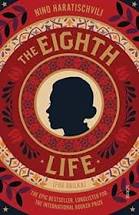The full title of this masterpiece is ‘The Eighth Life (For Brika). I struggle with this, because I believe in the book’s characters to such an extent I can’t imagine Brilka isn’t real and so totally deserves the narrative her aunt has painstakingly researched and presented for her. At the same time, part of me is smugly almost-sure she’s fiction in which case I’m taking this book because it was definitely written directly for me. I love Russian fiction, I love long books, I love novels which understand and play with their place in the literary tradition.
‘The Eighth Life’ is clearly a Georgian War and Peace, which means I get the pure satisfaction of reading one of my favourite novels through a new lens (Soviet and contemporary rather than Russian and 19th century). But of course, there has already been a twentieth century ‘War and Peace,’ it’s Vasili Grossman’s monumental ‘Life and Fate,’ which, written after World War II, updates Tolstoy’s narrative to address the Holocaust, the siege of Stalingrad and the purges and repression of the Soviet regime. So ‘The Eighth Life’ is also a Georgian ‘Life and Fate.’ In fact, I like to imagine there are at least five other massive and wonderful novels retreading this ground from different places and periods of Russia’s empire-building history and Haratischvili’s ‘Eighth Life’ is a knowing pinnacle of this series.
What ‘The Eighth Life’ achieves is a personal, epic, historical story that is firmly placed within its literary and cultural context. Although ideas, themes and settings from Tolstoy and Grossman are reworked, the result is never derivative and consistently powerful. Within the novel itself, much of this is credited to Georgia’s specific culture and people. The first, but not the last, time I chuckled out loud was on page 8, at the parenthesis in the middle of a list of dogmatic statements made by the emigre narrator, who is remembering ‘the country that encourages in its inhabitants endearing traits like the sacred virtue of hospitality, and less endearing traits, like laziness, opportunism, and conformism (this is certainly not the perception of the majority – you and I agree on this, too).
The book is not all enjoyably informative and dogmatic blanket statements and self-conscious narrative. It follows six generations of a Georgian family, whose successes in business, the arts and the Communist Party are always precarious, in danger of being destroyed by strong willed-women in every generation. That’s my thumbnail synopsis; according to the original patriarch, a chocolatier and the narrator’s great-great-grandfather, the tragedies that befall the family are the result of his unique intoxicating chocolate recipe, which is delicious in small amounts but curses those who experience its raw, undiluted wonders.
Arguably, you didn’t need cursed chocolate to encounter hardship in the USSR. Overshadowing the often tongue-in-cheek references to Georgian culture and place in the Soviet empire is the role of two of its sons, Stalin (referred to only as ‘the Generalissimus’ and Beria (who appears in the novel as the terrifying ‘Little Big Man’). There are scenes of devastation, brutality and torture as tough as anything I’ve read about the siege of Stalingrad, Soviet state paranoia and toxic masculinity. But at over 900 pages there is space to do these episodes justice and then time for us to understand the resulting trauma on the characters. The distress adds to the complexity of the whole novel, making it richer and more satisfying but also allowing harmony with the humour and more light-hearted moments that make up the characters’ lives.
I’d been tempted by ‘The Eighth Life’ since I saw it on shelves; lockdown has been the perfect time to loose myself in it. If you’re someone for whom social isolation has meant increased free time and a disinclination to concentrate on the present, I hope you will consider reading this, and that you will get as much pleasure as I did from the experience. I’ll even be prepared to share ownership, if you honestly think think this book was written for you as strongly as I believe its truest title is ‘The Eighth Life (for Shoshi)’.




I read this before Lockdown but I agree it’s the perfect book to lose yourself in, and also to get a sense of perspective. We had 114 days of severe lockdown here in Melbourne: we were not allowed out of the house except for one hour’s exercise or shopping for essentials and there was an 8pm curfew. No visitors, not even family. A 5k limit on movement outside the house. All the other shops, hospitality and entertainment venues, schools and universities were shut, and for most things we couldn’t even go to the doctor unless it couldn’t be done by telehealth.
And there was a vocal minority complaining about it… who had obviously never read about Anne Frank and other people who were hidden in miserable small spaces during the Nazi era.
I heard that many people wanted comfort reading, but I spent my lockdown mostly reading about people who’d faced far greater challenges and it made my real world seem benign by comparison.
BTW If you can get everyone to cooperate, lockdown works. We have eliminated all local transmission here and #TouchWood it will stay that way. It’s opening up again too soon when people start clamouring for it that wrecks it. Which doesn’t happen if governments follow medical advice from the experts…
I have had trouble with reading during our various lockdown/easings over the past year. Hoping that at least I’m finding fictional escapism through books easier now – ‘Eighth Life’ really worked for me and you’re right, reading about the siege of Stalingrad from London lockdown did help with my perspective on life and literature!
This sounds awesome! Anything that follows in the traditions of such great works is enough for me.
It really lived up to my hopes – hope you love it as much as I have 🙂